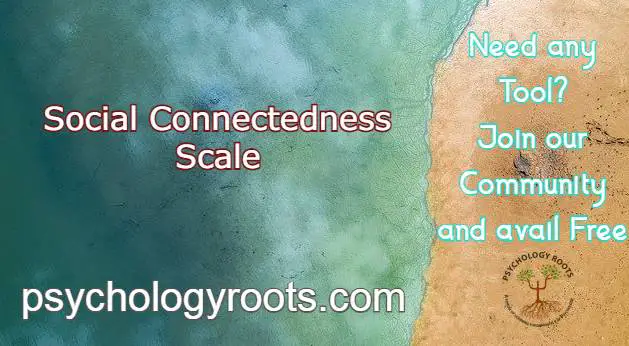Table of Contents
Social Connectedness Scale
Here in this post, we are sharing the “Social Connectedness Scale”. You can read psychometric and Author information. We have thousands of Scales and questionnaires in our collection (See Scales and Questionnaires). You can demand us any scale and questionnaires related to psychology through our community, and we will provide you with a short time. Keep visiting Psychology Roots.
About Social Connectedness Scale
Scale Name
Social Connectedness Scale
Author Details
Richard Lee and Steven Bernard Robbins
Translation Availability
English

Background/Description
The Social Connectedness Scale measures the degree to which individuals, particularly youth, feel emotionally connected to others in their social environment. Social connectedness is critical for mental health and well-being, influencing areas such as self-esteem, interpersonal relationships, and resilience to stress.
This 8-item scale, developed by Lee and Robbins (1995), is widely used for assessing social bonds and feelings of belongingness among adolescents aged 14–18 years. The scale uses a 6-point Likert format, making it easy to administer and interpret. A higher score reflects greater levels of social connectedness.
Administration, Scoring and Interpretation
- Target Population: Adolescents aged 14–18 years (Grades 8–12).
- Format: Self-report questionnaire with 8 items.
- Instructions: Respondents indicate their agreement with each statement on a scale ranging from 1 (Strongly Disagree) to 6 (Strongly Agree).
- Duration: Approximately 5–10 minutes to complete.
- Environment: Ensure a quiet and private setting for participants to answer honestly.
- Scoring:
- Reverse code all 8 items before summing the responses.
- Higher total scores indicate stronger social connectedness.
Reliability and Validity
- Reliability: Cronbach’s alpha = 0.91, demonstrating excellent internal consistency.
- Validity: The scale has robust construct validity and has been extensively validated in adolescent populations, making it a reliable measure of social connectedness.
Available Versions
08-Items
Reference
Lee, R. M., & Robbins, S. B. (1995). Measuring belongingness: The social connectedness and the social assurance scales. Journal of counseling psychology, 42(2), 232.
Important Link
Scale File:
Frequently Asked Questions
Q1: What does the Social Connectedness Scale measure?
It measures the level of emotional connection an individual feels with others in their social environment.
Q2: Who can use this scale?
The scale is designed for adolescents aged 14–18 years (Grades 8–12).
Q3: How is the scale scored?
All items are reverse coded, and the responses are summed to generate a total score. A higher score indicates greater social connectedness.
Q4: Can this scale be used freely?
Permission is required from the authors to use this scale.
Q5: Is the scale suitable for research purposes?
Yes, the scale is widely used in research settings to measure social connectedness in adolescents.
Disclaimer
Please note that Psychology Roots does not have the right to grant permission for the use of any psychological scales or assessments listed on its website. To use any scale or assessment, you must obtain permission directly from the author or translator of the tool. Psychology Roots provides information about various tools and their administration procedures, but it is your responsibility to obtain proper permissions before using any scale or assessment. If you need further information about an author’s contact details, please submit a query to the Psychology Roots team.
Help Us Improve This Article
Have you discovered an inaccuracy? We put out great effort to give accurate and scientifically trustworthy information to our readers. Please notify us if you discover any typographical or grammatical errors.
Make a comment. We acknowledge and appreciate your efforts.
Share With Us
If you have any scale or any material related to psychology kindly share it with us at psychologyroots@gmail.com. We help others on behalf of you.